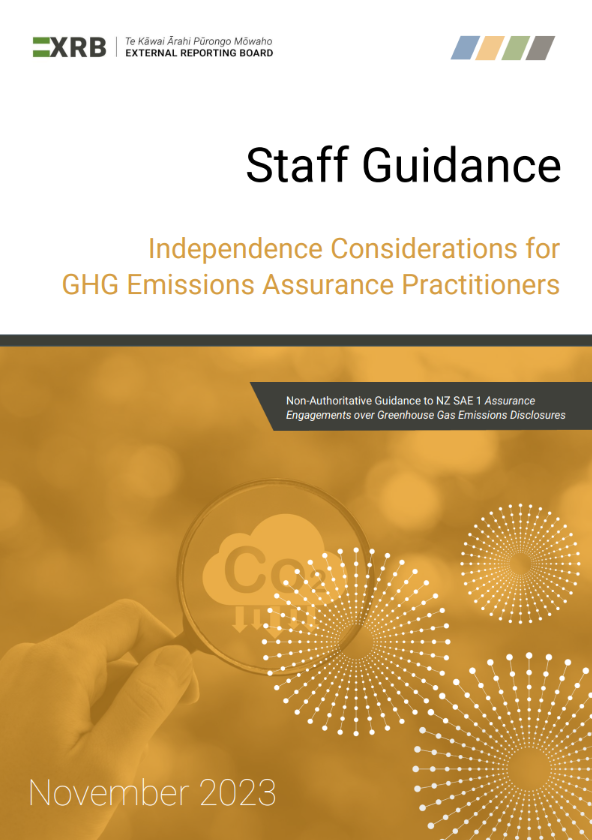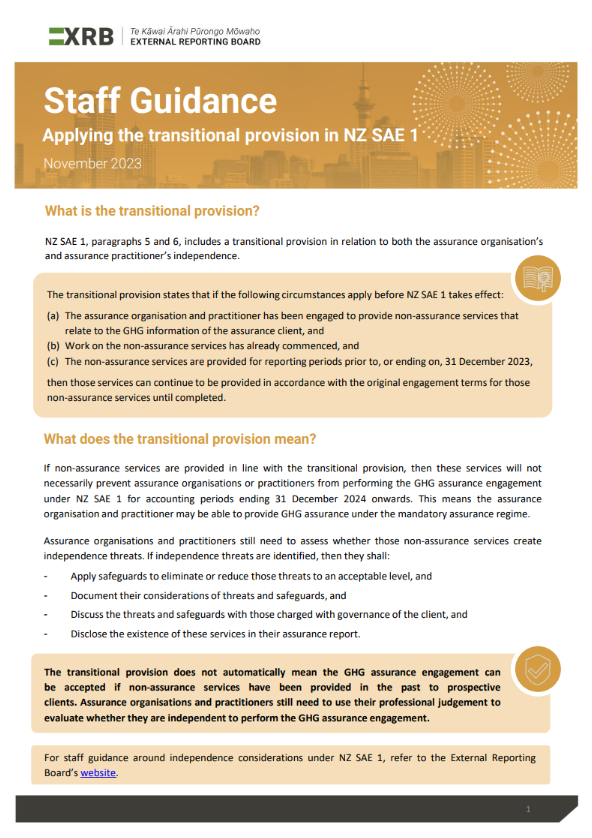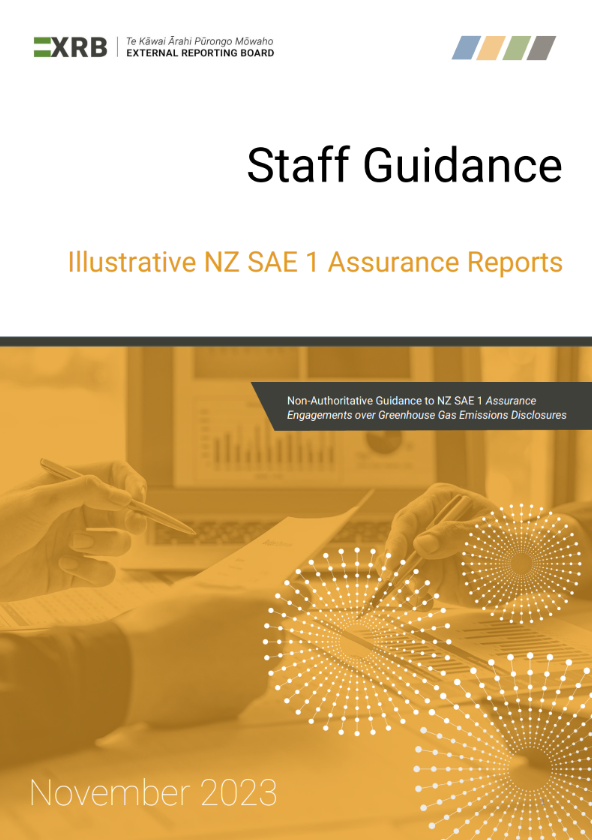This standard deals with the assurance practitioner’s responsibilities when conducting an assurance engagement for the disclosures within the climate statements relating to GHG emissions required by the Financial Markets Conduct Act 2013 to be the subject of an assurance engagement.
NZ SAE 1
Assurance Engagements over Greenhouse Gas Emissions Disclosures

Applicable for periods as indicated. Also applies to subsequent periods until that standard is superseded by a new/amended/revised standard. Versions prior to the Previous version below will have been archived.
Amendments
Previous versions
Questions and answers
Here are some frequently asked questions from one of our publications. Read more of the publication here, or find it under guidance and useful information below.
Section 461ZJ of the Financial Markets Conduct Act 2013 requires a Climate Reporting Entity’s (CRE) annual report to include a copy of the climate statement, or the address of a link to the internet site where a copy of the climate statements can be accessed.
As a result, financial statement auditors will need to consider the climate statement as other information, given this information will be included, or linked from, the annual report, and is likely to be relevant to their audit of the financial statements.
If a CRE uses an exemption around including the climate statement within their annual report, then the auditor would need to identify this other information within their auditor’s report, in line with paragraph NZ22.1(b)(ii) of ISA (NZ) 720.
Under NZ SAE 1, for GHG assurance practitioners who are not the financial statement auditors, the way the Climate Reporting Entity reports their climate statement will impact on the extent of other information relevant to the GHG assurance engagement.
- Where the climate statement is included within the annual report, the other contents of the annual report, including the financial statements, would be other information for the purposes of the GHG assurance engagement.
- Where the climate statement is reported separately from the annual report, the other information will be limited to the information published in conjunction with the climate statement.
- Where the climate statement is reported separately from the annual report but voluntarily includes a links to the annual report, then the annual report, including the financial statements, would be other information for the purposes of the GHG assurance engagement.
A quality reviewer should be involved throughout the GHG emissions engagement to evaluate whether:
- The assurance engagement has been planned and designed appropriately;
- The significant judgements made are reasonable;
- Sufficient and appropriate evidence was obtained to support the assurance conclusions; and
- The GHG disclosures and assurance report are appropriate.
This may require the quality reviewer to have regular discussions with the engagement team around significant or judgemental areas of the engagement (for example: more involvement may be needed when there are highly material judgements made by management to quantify scope 3 emissions).
Quality Reviewers need to be independent, have sufficient competence and capabilities to perform the quality review. They should have appropriate authority to challenge the engagement leader.
Quality Reviewers should consider whether they have the following:
- Technical skills in both assurance and measurement and reporting of GHG emissions;
- Industry specific knowledge and awareness of significant judgements and emissions-related challenges which are relevant to the industry;
- Knowledge of the requirements of NZ SAE 1 and the assurance organisation’s methodology in relation to performing GHG assurance engagements;
- Awareness of what makes a high-quality GHG assurance engagement and knowledge of different types of assurance approaches which could be used in different situations;
- Ability to review assurance working papers and examine assurance evidence and how this may be used to form a conclusion;
- Ability to challenge peers/colleagues effectively and constructively and be able to respond to challenges; and
- Communication skills to be able to highlight quality concerns and resolutions to senior and junior assurance team members, both verbally and in writing.
An independent quality reviewer is required for each individual engagement performed under NZ SAE 1. Smaller organisations such as sole practitioners, may need to arrange other assurance organisations to provide quality reviewer services, and incorporate this cost into the fees charged to the Climate Reporting Entity.
It is important that the assurance organisation ensures any external quality reviewer has the appropriate skills. The quality review must be documented on the assurance engagement file. Arrangements between assurance organisations should allow for these procedures to occur, without restriction or conditions.
Under the climate-related disclosure framework, scope 1 and 2 GHG emissions do not pertain to MIS Managers. This is because Section 461O of the Financial Markets Conduct Act 2013 defines MIS Managers as climate reporting entities in respect of the scheme they manage. Therefore, no disclosures are required. Because there is no disclosure, there is no need for a related assurance engagement.
We recommend that MIS Managers include the following wording in their climate statements to clarify this point to their primary users:
“Note on emissions disclosures: scope 1 and 2 greenhouse gas emissions do not pertain to MIS Manager disclosures because S461O of the Financial Markets Conduct Act 2013 defines MIS Managers as climate reporting entities in respect of the scheme they manage, therefore no disclosures are required”.
If a MIS Manager chooses to make scope 1 and 2 GHG emissions disclosures, even if it says zero or nil scope 1 and 2 GHG emissions, it would need to obtain an assurance engagement over that disclosure.
Guidance and useful information
|






